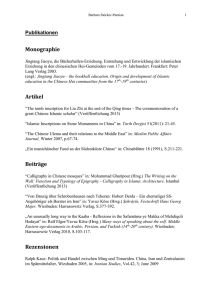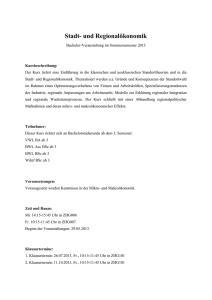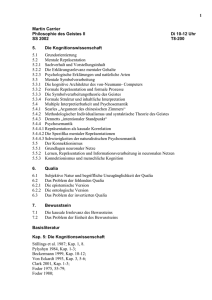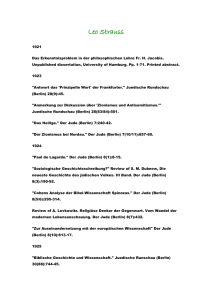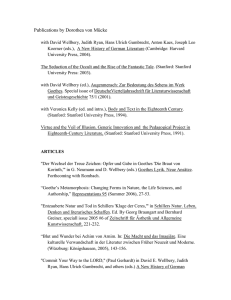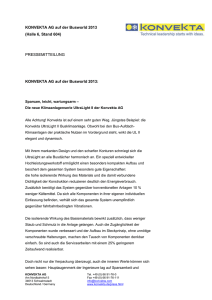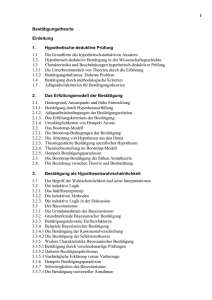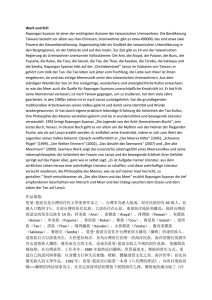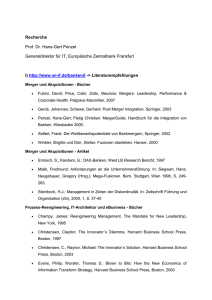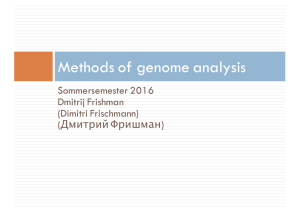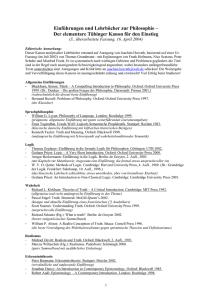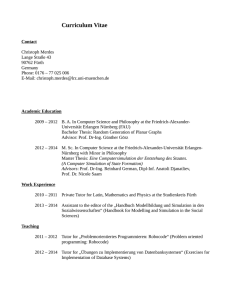NeueEinf頬hrung in die chinesische Philosophie
Werbung
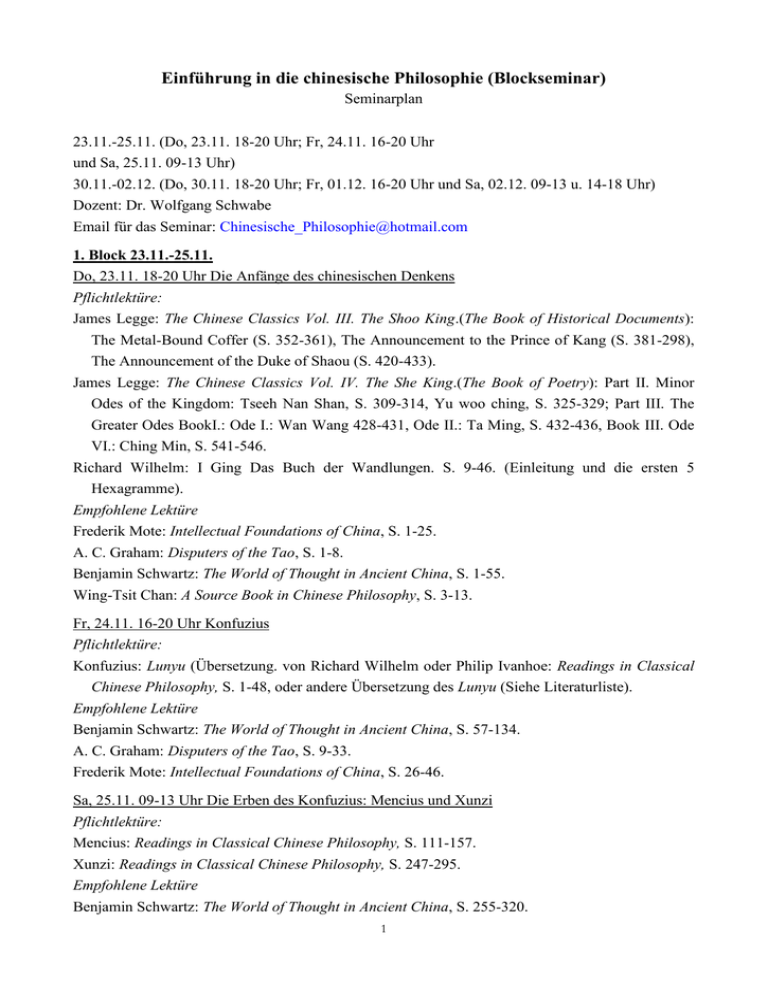
Einführung in die chinesische Philosophie (Blockseminar) Seminarplan 23.11.-25.11. (Do, 23.11. 18-20 Uhr; Fr, 24.11. 16-20 Uhr und Sa, 25.11. 09-13 Uhr) 30.11.-02.12. (Do, 30.11. 18-20 Uhr; Fr, 01.12. 16-20 Uhr und Sa, 02.12. 09-13 u. 14-18 Uhr) Dozent: Dr. Wolfgang Schwabe Email für das Seminar: [email protected] 1. Block 23.11.-25.11. Do, 23.11. 18-20 Uhr Die Anfänge des chinesischen Denkens Pflichtlektüre: James Legge: The Chinese Classics Vol. III. The Shoo King.(The Book of Historical Documents): The Metal-Bound Coffer (S. 352-361), The Announcement to the Prince of Kang (S. 381-298), The Announcement of the Duke of Shaou (S. 420-433). James Legge: The Chinese Classics Vol. IV. The She King.(The Book of Poetry): Part II. Minor Odes of the Kingdom: Tseeh Nan Shan, S. 309-314, Yu woo ching, S. 325-329; Part III. The Greater Odes BookI.: Ode I.: Wan Wang 428-431, Ode II.: Ta Ming, S. 432-436, Book III. Ode VI.: Ching Min, S. 541-546. Richard Wilhelm: I Ging Das Buch der Wandlungen. S. 9-46. (Einleitung und die ersten 5 Hexagramme). Empfohlene Lektüre Frederik Mote: Intellectual Foundations of China, S. 1-25. A. C. Graham: Disputers of the Tao, S. 1-8. Benjamin Schwartz: The World of Thought in Ancient China, S. 1-55. Wing-Tsit Chan: A Source Book in Chinese Philosophy, S. 3-13. Fr, 24.11. 16-20 Uhr Konfuzius Pflichtlektüre: Konfuzius: Lunyu (Übersetzung. von Richard Wilhelm oder Philip Ivanhoe: Readings in Classical Chinese Philosophy, S. 1-48, oder andere Übersetzung des Lunyu (Siehe Literaturliste). Empfohlene Lektüre Benjamin Schwartz: The World of Thought in Ancient China, S. 57-134. A. C. Graham: Disputers of the Tao, S. 9-33. Frederik Mote: Intellectual Foundations of China, S. 26-46. Sa, 25.11. 09-13 Uhr Die Erben des Konfuzius: Mencius und Xunzi Pflichtlektüre: Mencius: Readings in Classical Chinese Philosophy, S. 111-157. Xunzi: Readings in Classical Chinese Philosophy, S. 247-295. Empfohlene Lektüre Benjamin Schwartz: The World of Thought in Ancient China, S. 255-320. 1 A. C. Graham: Disputers of the Tao, S. 107-132. Frederik Mote: Intellectual Foundations of China, S. 46-53. 2. Block 30.11.-02.12. Do, 30.11. 18-20 Uhr Daoismus I. Laozi Pflichtlektüre: Laozi Übersetzung. von Richard Wilhelm oder Readings in Classical Chinese Philosophy, S. 157-203 oder andere Übersetzung des Laozi (sieheLiteraturliste). Empfohlene Lektüre: Benjamin Schwartz: The World of Thought in Ancient China, S. 186-215. A. C. Graham: Disputers of the Tao, S. 213-234. Frederik Mote: Intellectual Foundations of China, S. 59-72. Fr, 01.12. 16-20 Uhr Daoismus II. Zhuangzi Pflichtlektüre: Zhuangzi: Readings in Classical Chinese Philosophy, S. 203-247. Empfohlene Lektüre: Benjamin Schwartz: The World of Thought in Ancient China, S. 215-237. A. C. Graham: Disputers of the Tao, S. 170-204. Frederik Mote: Intellectual Foundations of China, S. 73-77, 92-94. Sa, 02.12. 09-13 u. 14-18 Uhr Mozi und Han Fei, Abschlußdiskussion Teil 1: Mozi Pflichtlektüre: Mozi: Readings in Classical Chinese Philosophy, S. 55-110. Empfohlene Lektüre: A. C. Graham: Disputers of the Tao, S. 33-52. Frederik Mote: Intellectual Foundations of China, S. 77-83. A. C. Graham: Disputers of the Tao, S. 135-172. Teil 2: Han Fei Pflichtlektüre: Hanfeizi: Readings in Classical Chinese Philosophy, S. 295-344. Empfohlene Lektüre: Benjamin Schwartz: The World of Thought in Ancient China, S. 321-349. A. C. Graham: Disputers of the Tao, S. 267-292. Frederik Mote: Intellectual Foundations of China, S. 99-114. Teil 3 Abschlussdiskussion Die wichtigsten im Seminar verwendeten Bücher Graham, A. C.: Disputers of the Tao. La Salle, Illionois: Open Court Press, 1989. 2 Ivanhoe, Philip and Van Norden, Brian (ed.): Readings in Classical Chinese Philosophy.New York: Seven Bridges Press, 2001. Mote, Frederik: Intellectual Foundations of China, New York: McGraw-Hill Publishing Company, 1989 (second edition) Schwartz, Benjamin: The World of Thought in Ancient China, Cambridge, MA: Harvard University Press, 1985. Weitere im Seminar verwendete Bücher Legge, James: The Chinese Classics Vol. III. The Shoo King.(The Book of Historical Documents). Taipei. SMC Publishing Inc., 1991. Legge, James: The Chinese Classics Vol. IV. The She King.(The Book of Poetry) Taipei. SMC Publishing Inc., 1991. Wilhelm, Richard: I Ging : das Buch der Wandlungen, aus dem Chines. verdt. und erl. von Richard Wilhelm, Diederichs 2001. (26. Auflage) Wing-Tsit Chan: A Source Book in Chinese Philosophy. Princeton: Princeton University Press, 1963. Weitere Literaturangaben, thematisch geordnet 1. Einführungen in die chinesische Philosophie und Nachschlagewerke Bauer, Wolfgang: Geschichte der chinesischen Philosophie. München: Verlag C.H. Beck, 2001. Forke, Alfred: Geschichte der alten chinesischen Philosophie, Hamburg 1964 (2. Aufl.; 1. Aufl. 1927) Fung Yu-lan, A History of Chinese Philosophy, ed. Derk Bodde. Princeton: Princeton University Press, 1952. Geldsetzer, Lutz/ Hong, Han-ding: Grundlagen der chinesischen Philosophie, Stuttgart 1998. Munro, David, The Concept of Man in Early China. Stanford: Stanford University Press, 1969. Needham, Joseph: Science and Civilisation in China, vol. 2. Cambridge: Cambridge University Press. Roetz, Heiner: Die chinesische Ethik der Achsenzeit, Frankfurt am Main 1992. Wing-tsit Chan: A Source Book in Chinese Philosophy. Princeton University Press, 1963. Zhang Dainian: Key Concepts in Chinese Philosophy, translated and edited by Edmund Ryden. Beijing: Foreign Language Press, New Haven and London: Yale University Press, 2002. 2. Anfänge des Chinesischen Denkens Nylan, Michael, The Five “Confucian“ Classics. New Haven. Yale University Press, 2001. Pines, Yuri Foundations of Confucian Thought: Intellectual Life in The Chunqiu Period, 722-453 B.C.E. Honululu: University of Hawaii Press, 2002. Shaughnessy, Edward L., Before Confucius. Studies in the Creation of the Chinese Classics. State University of New York Press, 1997. 3. Zum Konfuzianismus Ames, Roger, Thinking Through Confucius. 3 Creel, Herrlee G.:Confucius and the Chinese Way. New York: Harper Torchbooks, 1960; o.p. Confucius: The Man and the Myth, 1949. Fingarette, Herbert: Confucius: The Secular as Sacred. New York: Harper & Row, 1972. Graham, A.C.: "The Background of the Mencian Theory of Human Nature," in Graham, Angus: Studies in Chinese Philosophy and Philosophical Literature. Albany: SUNY Press, 1990. Goldin, Paul R.: The Rituals of the Way: Philosophy of Xunzi. La Salle Ilinois: Open Court, 1999. Hall, David and Ames, Roger: Thinking Through Confucius. Albany: SUNY Press, 1987 Ivanhoe, Philip: Ethics in the Confucian Tradition: The Thought of Mencius and Wang Yang-ming. Atlanta: Scholars Press, 1990. Ivanhoe, Philip J.: "Thinking and Learning in Early Confucianism," Journal of Chinese Philosophy 17:4 (December 1990), pp. 473-493. Kline, T.C. and Ivanhoe, Philip (ed.): Virtue, Nature, and Moral Agency in the Xunzi. Indianapolis: Hackett Publishing Company, 2000. Knoblock, John: Xunzi. Stanford: Stanford University Press, 1988, 1990, 1994, 3 vols. Köster, Hermann: Hsün-tzu, ins Deutsche übersetzt, Siegburg 1967. Köster, Hermann: Hsün-tzu, Kaldenkirchen 1957. Köster, Hermann: “Zur Philosophie des Hsün Ch’ing. Eine Parallele chinesischen und westlichen Denkens“, in: Huppertz, Joseph und Köster, Hermann (Hg.): Kleine Chinabeiträge, München 1979. Lau, D.C.: Confucius: The Analects. New York: Penguin Books, 1979. Lau, D.C.: "Theories of Human Nature in Mencius and Shyuntzyy," Bulletin of the School of Oriental and African Studies 15:3 (1953), pp. 541-565. Lau, D.C.: Mencius New York: Penguin Books, 1970. Legge, James: Confucian Analects, The Great Learning, and The Doctrine of the Mean. New York: Dover Books, 1971; o.p. 1893. Legge, James: Mencius. New York: Dover Books, 1970; o.p. 1895. Liu Xiusheng and Ivanhoe, Philip (ed.): Essays on the Moral Philosophy of Mengzi. Indianapolis: Hackett Publishing Company, 2002. Roetz, Heiner: Konfuzius, München 1995. Sato, Masazuki: The Confucian Quest for Order. The Origin and Formationof the Political Thought ogf Xun Zi. Leiden: Brill, 2003. Stange, Hans O. H.: Gedanken und Gespräche des Konfuzius, München 1953. Van Norden, Bryan W.(ed.): Confucius and the Analects. New Essays. Oxford: Oxford University Press, 2002 Van Norden, B.W.: "Mengzi and Xunzi: Two Views of Human Agency," International Philosophical Quarterly 32:2 (June 1992), pp. 161-184. Waley, Arthur: The Analects of Confucius New York: Vintage Books, 1989; o.p. 1938. Waley, Arthur: The Way and its Power. A Study of the Tao Te Ching and its Place in Chinese Thought. New York: Grove Press, 1958. Watson, Burton: Hsün-tzu: Basic Writings. New York: Columbia University Press, 1963. 4 Wilhelm, Richard: Mong Dsi. Die Lehrgespräche des Meisters Meng K’o, Jena 1916. Wilhelm, Richard: Kungfutse. Gespräche (Lun Yü), Jena 1910 (Erw. Neuaufl. Düsseldorf 1979). 4. Zum Daoismus Ames, Roger (ed.), Wandering at Ease in the Zhuangzi. Albany, NY, 1998. Billeter, Jean-Francois: “Ding, der Koch, zerlegt ein Stück Rind. Eine grundsätzliche Annahme über den Ausgangspunkt philosophischen Denkens in China”, in: Asiatische Studien 36.2 (1982), 85-101. Cook, Scott (ed.): Hiding the World in the World: Uneven Discourses on the Zhuangzi. Albany: State University of New York Press, 2003. Creel, Herrlee G :What Is Taoism? And Other Studies in Chinese Cultural History. Chicago: University of Chicago Press, 1970. Graham, A.C.:Chuang-tzu: The Inner Chapters Boston: Unwin Paperbacks, 1989; o.p. 1981. Ivanhoe, Philip J. and Csikszentmihalyi, Mark (eds.): Essays on Religious and Philosophical Aspects of the Laozi. Albany: SUNY Press, 1999). Kaltenmark, Max: Lao-Tzu und der Taoismus. Aus dem Franz. Von Manfred Porkert. Frankfurt am Main: Suhrkamp,1981 Kjellberg, Paul and Ivanhoe, Philip J. (eds.): Essays on Skepticism, Relativism, and Ethics in the Zhuangzi Albany, NY: SUNY Press, 1996. Kohn, Livia and LaFargue, Michael (eds.): Lao-tzu and the Tao-te-ching. Albany: SUNY Press, 1998. Mair, Victor (ed.): Experimental Essays on Chuang-tzu. Honolulu: University of Hawaii Press, 1983. Mair, Victor: Wandering on the Way: Early Taoist Tales and Parables of Chuang Tzu Honolulu, HI: University of Hawaii Press, 1998. Möller, Hans-Georg: Laotse. Tao Te King (Laozi, Daodejing). Die Seidentexte von Mawangdui 500 Jahre älter als andere Ausgaben, Frankfurt am Main 1995. Möller, Hans-Georg: In der Mitte des Kreises: daoistisches Denken, Frankfurt am Main 2001. Strauss, Victor von: Lao-Tse´s Tao Te King. Aus dem Chinesischen übersetzt und kommentiert von Viktor von Strauss. Bearbeitet und eingeleitet von Willi Y. Tonn, Zürich 1959 (Erstersch. 1870). Van Norden, Bryan W.:"Competing Interpretations of the Inner Chapters," Philosophy East and West 46:2 (April 1996). Watson, Burt: The Complete Works of Chuang Tzu. New York: Columbia University Press, 1968. Watson, Burton: Chuang Tzu: Basic Writings. New York: Columbia University Press, 1964. Wilhelm, Richard: Laotse: Tao Te King. Das Buch des Alten vom Sinn und Leben, Jena 1911 (Erw. Neuaufl. Düsseldorf 1978). Wilhelm, Richard: Dschuang Dsi. Das wahre Buch vom südlichen Blütenland. Nan-hua Dschen ging, Jena 1912 (Neuaufl. Düsseldorf 1979). 5. Zu Mozi 5 Forke, Alfred: Me Ti - des Sozialethikers und seiner Schüler philosophische Werke, Berlin 1922. Graham, A.C.: Later Mohist Logic, Ethics, and Science. London: School of Oriental and African Studies, 1978. Lowe, Scott: Mo Tzu's Religious Blueprint for a Chinese Utopia. Lewiston, UK: Edwin Mellen Press, 1992. Mei Yi-pao: The Ethical and Political Works of Motse. Westport, Conn.: Hyperion Press, 1973; o.p. 1929. Paul, Gregor: Die Aktualität der klassischen chinesischen Philosophie. Rationalitätskonzepte im frühen Konfuzianismus, im Neo-Mohismus und im Legalismus, München 1987. Watson, Burton: Mo Tzu: Basic Writings. New York: Columbia University Press, 1963. 6. Zu Han Feizi Chen, Ellen Marie “The Dialectic of Chih (Reason) and Tao (Nature) in the Han Fei-Tzu.” Journal of Chinese Philosophy. 3.1 (1975), S. 1-22. Mögling, Wilmar: Macht und Gesetz in den Auffassungen des Han Fei-zi. Eine Studie zum altchinesischen Legismus, Diss. Leipzig 1987 Mögling, Wilmar: Die Kunst der Staatsführung. Die Schriften des Meisters Han Fei. Leipzig 1994. Thiel, Joseph: “Die Staatsauffassung des Han Fei-tzu”, in: Sinologica 6.3-4 (1960-61), 171-192; 225-270. Wang, Hsiao-po, and Chang, Leo S.: The Philosophical Foundations of Han Feis Political Thought. Honululu: University of Hawaii Press, 1986. Watson, Burt: Han Fei Tzu: Basic Writings. New York: Columbia University Press, 1964. Anmerkungen: 1. Die unter Pflichtlektüre vermerkten Primärquellen sind von allen Seminarsteilnehmern vorzubereiten, von der empfohlenen Lektüre sollte zumindest ein Text gelesen werden. 2. Referate werden zu jedem Thema vergeben. Ein Referat soll zur Einführung dienen und nicht länger als 20 Minuten sein. Sollten sich zu einem Thema mehrere Interessenten finden, können Referate thematisch enger eingegrenzt werden. Interessenten für Referate melden sich bitte bei mir per email an (Email für das Seminar: [email protected]) In der Literaturliste finden sich weitere Literaturhinweise nach Themen sortiert. 3. Zum Erwerb eines Scheines ist eine 10-15 seitige Hausarbeit anzufertigen. 6
